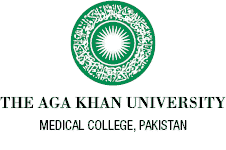The Department of Pathology and Laboratory Medicine, Aga Khan University conducted a COVID-19 research seminar led by Professor Zahra Hasan as part of a Higher Education Commission COVID-19 Rapid Research Grant science dissemination seminar on 22 June 2022. The research has focused on understanding the changing biology of the SARS-CoV-2 virus and its impact on host responses by studying COVID-19 patients. She explained how AKU conducted extensive virus surveillance to follow the Variants of Concern (alpha, beta, gamma, delta and omicron) through the pandemic waves.
The seminar exemplified a private-public partnership comprising academia, the provincial and national health authorities and the World Health Organisation. Despite the acuteness of the concerns surrounding the pandemic, the clinical laboratory responded to the challenge, scaled up testing and worked with provincial and sectoral partners to develop a reporting and surveillance system that could inform the public health response. The AKU was a key part of the Genome Consortium established by NIH, Islamabad.
Speakers expanded on the importance of collaboration between high-level basic scientists, clinical researchers and public health teams in bringing about an effective pandemic response. Dr. Uzma Bashir, WHO, spoke on how we had true private public partnership at the level of laboratory diagnostics that allowed introduction and scale up of testing for SARS-CoV-2. Dr. M. Asif Syed, Department of Health, Government of Sindh, described the strategies taken by provincial governments to restrict transmission and effect lockdowns based on COVID-19 case data. Dr. Bushra Jamil, AKU spoke on treatment for COVID-19, and how the government facilitated management of patients at the peak of the delta wave in 2021, by expanding oxygen supplies to hospitals. Dr. Kiran Iqbal, AKU spoke of how Interferon responses are associated with early recovery in COVID-19. Dr. Javaria Ashraf, AKU described the way big data from studies of host genetics can be used to understand how the body responds to disease. Dr. Asghar Nasir, AKU talked about the establishment of genomic sequencing for SARS-CoV-2 that allowed identification of virus types through the pandemic. Dr. Ali Raza, AKU described how viral sequencing can be used to track and trace variants that may be introduced through travellers from different countries. Dr. Najeeha Iqbal, AKU described surveillance of virus through the omicron wave in Pakistan. Dr. Imran Nisar, AKU, spoke on the value of SARS-CoV-2 surveillance in wastewater and how it was possible to predict a COVID-19 surge weeks in advance through appropriate sewage sampling. Dr. Waqasuddin Khan, AKU, described building a free-access Pakistan-specific SARS-CoV-2 genome analysis pipeline that allows visualization of the strain types across time.
The seminar informed on the current COVID-19 wave with the recent surge associated with BA.4 and BA.5 variants which are extremely infectious. Further, there is a need for COVID-19 booster vaccinations at the current time particularly in those who have health related risk factors and in those aged 50 years and above.


